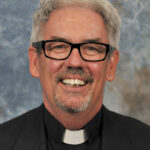
Could we be witnessing tentative steps toward bridge building in our hurting church and culture? Last week, Catholic News Service reported on the National Catholic Prayer Breakfast, an event which writer Kurt Jensen said often puts more emphasis on politics and pro-life advocacy. This year, evangelism and Christian unity were the main topics of the Sept. 14 event, he said.
Bishop Steven J. Lopes, who heads the Houston-based Personal Ordinariate of the Chair of St. Peter, told the prayer breakfast audience, “Our fundamental reverence for the sanctity of human life does not begin at birth. Nor does it end at the border. That’s what it means to be Catholic.” Devotion to the dignity of the individual person “gets uncomfortable, because it puts us on edge and at the edge of political discourse,” he told the audience of about 1,100 people.
Were event organizers and participants inspired by the “Civilize It: A Better Kind of Politics” initiative of the U.S. Conference of Catholic Bishops, introduced one week before the prayer breakfast? The initiative (CivilizeIt.org) seeks to inspire Catholics to counter polarization and division in the church and society by cultivating “a culture of encounter, root perspectives in truth, justice and solidarity and seek collaborative action for the common good.”
Civilize It builds on the USCCB initiative implemented during the 2019-20 election season, which sadly, fell on deaf ears because the election season was anything but civil. Let us pray for patience and humility and lean into God’s guidance to make this initiative bear fruit for the sake of our church and our relationship with one another.
In announcing the initiative, Archbishop Paul S. Coakley of Oklahoma City, who chairs the USCCB’s Committee on Domestic Justice and Human Development, spoke about its importance for this time. “Such division among the faithful compromises the Church’s ability to effectively witness to the life and dignity of the human person in the family, parish, workplace and political sphere.” He referenced the latest encyclical by Pope Francis, “Fratelli Tutti,” which provided inspiration for the initiative. “Pope Francis offers a different way forward based on Gospel values, justice and truth. My hope is that this initiative will assist all of us as we seek to ‘become neighbors to all,’ as the Holy Father calls us to do, and take up the challenges of encounter, dialogue, truth-seeking, and creative problem-solving, in order that all Catholics can work together for the common good.”
Pope Francis calls us to “build bridges, to break down walls, to sow seeds of reconciliation” (Fratelli Tutti no. 276). The tools of dialogue can help us to do this, the bishops say in their Civilize It materials (CivilizeIt.org). We begin by recognizing God’s presence in every person, created with dignity and in his image — even those with whom we disagree. “We show love for God and reverence for all whom he has created through a disposition of respect and by listening to others in order to truly understand.” What does that look like in reality? Listening without interrupting, recapping what we understand the speaker to be saying, letting go of a dismissive tone or attitude and avoiding shouting and raising our voice.
Engaging in dialogue requires preparation, which should begin with formation of our consciences through prayerful reflection, study of Scripture and church teaching and guidance from reputable experts. Set the silo social media outlets aside! Reputable resources include the USCCB (usccb.org), the Iowa Catholic Conference (iowacatholicconference.org), the Diocese of Davenport (davenportdiocese.org) and The Catholic Messenger (print, e-edition and website, catholicmessenger.net), whose publisher is Bishop Thomas Zinkula.
Bishop Zinkula and his fellow bishops acknowledge, “Entering into dialogue with someone with whom we might not agree can be scary or uncomfortable. That is ok. Staying in dialogue can be a way for us to grow together, finding connections and common ground where there seemed to be none” (CivilizeIt.org). Both parties in a dialogue must be committed to seeking the truth. “Truth, justice and peace hold one another accountable like a system of checks and balances,” the bishops say. Seeking truth through dialogue “requires clear thinking, thoughtful description of what we mean, and a sense of generosity in listening to one another.”
The CivilizeIt.org webpage provides terrific resources and tips for fruitful dialogue: Civilize It: A Better Kind of Politics Promotion Packet, Prayer for Civility, 5 Tips from Pope Francis for a “Better Kind of Politics,” Reflection on “Better Kind of Politics,” Examination of Conscience, Following Pope Francis: Dialogue in Fratelli Tutti, and Loving our Neighbor Through Dialogue.
Our Catholic Church’s future depends on our ability to build bridges with one another, to accompany one another on this pilgrim journey. It is doable. The message conveyed at the National Catholic Prayer Breakfast demonstrates the possibilities.
Barb Arland-Fye, Editor
arland-fye@davenportdiocese.org











